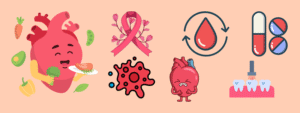Stop Overtreatment and Make Wiser Health Choices.In the modern world where medical technology and information are more developed than ever before, it is easy to think that more care is better care. However, in some cases, the reality is just the reverse, we might be receiving health care that we do not really require. Overs-testing and scanning, over-prescribing drugs and unnecessary procedures, over-treatment has become a silent epidemic in the world, both in terms of health and money.
The Hidden Problem of Over-treatment:
Although Most individuals believe that all medical tests or treatment prescriptions are necessary. Nevertheless, research indicates that much of the health expenditure is spent on unnecessary or low-value care, which does not enhance results or even end up harming the patient. As an example, mild back pain is commonly ordered imaging tests such as MRIs or CT scans, when rest and light activity typically help.
On the same note, antibiotics are also commonly prescribed in viral infections where they are not helpful. So these procedures do not only waste money, but also subject patients to dangers like side effects, radiation and antibiotic resistance.
There are many reasons why patients end up getting unnecessary care:
- Both the patient and the doctor are afraid of missing something serious.
- Most individuals anticipate a prescription or a test every time they visit, and they think that is what good care is.
- In certain health systems, the more the procedures, the more the profit, which promotes overuse.
- Doctors also request additional tests to avoid legal liability.
The Hidden Costs:
Although Unnecessary care is not harmless. It can lead to:
- Incidental findings can be revealed by extra tests which will cause anxiety and result in additional unnecessary procedures.
- All drugs and operations have a certain risk.
- Patients will tend to spend out of their own pocket on tests or treatments that do not add any real value.
- Overcare puts pressure on healthcare systems and takes away resources that are needed by patients.
Being an informed, active participant in your own care can help you avoid over-treatment:
- Ask questions.Before agreeing to any test or treatment, ask your doctor: Is it really necessary? What happens if I wait or do nothing?
- Seek a second opinion.Especially before surgeries or long-term medication plans.
- Understand risks and benefits.Every intervention has both — make sure the benefits clearly outweigh the risks.
- Avoid routine testing without symptoms.Regular screenings should be based on your age, risk factors, and health history — not habit.
- Trust evidence, not trends.Just because something is new or popular doesn’t mean it’s better.

Why Does Unnecessary Care Happen?
The reasons are complex and deeply rooted .
1. The Fear Factor
Particularly ,Physicians are usually under pressure to ensure that they do not miss anything. So, requesting additional tests is safer than the possibility of missing a diagnosis. This is referred to as defensive medicine .When physicians order more tests or treatments than the required. That is jus to prevent possible law suits or complaints.
2. Patient Expectations
Yet Most patients think that good care is something to do a pill, have an X-ray or have surgery. Just imagine, It seems like they are being sacked. Even when the doctor suggests that they take rest or change their lifestyle. Therefore, in order to meet expectations, physicians at times provide unnecessary treatment.
3. Financial Incentives
In other health systems, payment models encourage quantity and not quality. The more tests, admissions, and procedures performed, then the more the hospitals and clinics make. This has an economic incentive to exploit resources.
4. The Technology Temptation
The power and persuasion of modern medical technology is strong. MRI and CT scans are able to detect even minute abnormalities, yet in some cases they will show incidental findings, harmless variations that will cause additional unnecessary testing and anxiety.
5. The Information Gap
Misinformation is common in the internet where patients get their health information. They can insist on tests or treatment that they have read online, not because it is medically necessary.
The Consequences of Too Much Health Care
Unnecessary medical care isn’t just wasteful — it can be dangerous. Here’s how:
- Each test, drug, or surgery is risky. So stop overtreatment .For instance, the use of unnecessary antibiotics may cause resistance, allergy, or gut imbalance. Additionally, unnecessary imaging subjects patients to radiation. Moreover, surgeries may result in complications or infections.
- Furthermore, false-positive results of tests may cause panic. For example, imagine one is told that there could be a tumor; then, after weeks of worrying and additional tests, it turns out that there was nothing. Consequently, such a process of anxiety may hurt the mental well-being of an individual.
- In addition, health care is expensive. Co-pays, deductibles, and out-of-pocket expenses can be high even in insured countries. Therefore, it is no loss to anyone to pay money for care that does not enhance health.
- Finally, when time, money, and medical personnel are occupied attending to patients, who do not really need them, the resources are not left to attend to patients who are in need. As a result, overmedication overloads the health care system and delays essential services.

Examples :
Some of the most common forms of overuse include:
- Antibiotics are not effective against viruses such as flu or common cold, only bacteria so stop overtreatment . For instance, Excessive use causes antibiotic resistance – an increasing international health menace.
- Secondly, Most back pain will clear up in a couple of weeks through rest and exercise. Early scans seldom alter the treatment plans and usually show harmless abnormalities that lead to unnecessary anxiety.
- Although checkups are necessary, in healthy people with no symptoms or risk factors, some regular blood tests or scans are not necessary.
- In addition ,Most individuals consume supplements that they do not require and in large quantities, which can be toxic in fact so stop overtreatment .
- Indeed ,Under such conditions as mild joint pain or sinus issues, surgery is not necessarily the first choice.
How to Know if You’re Getting Unnecessary Care:
Being proactive can protect you. Here are some ways to evaluate ,whether a test or treatment is really needed:
- Ask “Why?”– Always ask your doctor why a test or procedure is necessary and how it will change your care.
- Ask About Alternatives.– Sometimes “watchful waiting,” rest, or lifestyle changes are just as effective.
- Ask About Risks and Benefits.– Every intervention has both. Make sure the benefit outweighs the risk.
- Seek a Second Opinion.– If something feels excessive, another doctor’s perspective can help clarify.
- Avoid Routine Testing Without Symptoms.– Annual tests should be based on age, gender, and medical history, not just habit.
- Do Your Research.– Use reliable sources like the World Health Organization (WHO).
Changing Mindsets :
True change requires effort from both sides.
For Doctors: They have to strike a balance between patient expectations and clinical judgment. Trust and overuse can be established by educating patients and communicating effectively about the advantages and disadvantages of care.
For Patients: We need to be taught to appreciate the needed care rather than the excess care. It is important to have faith in your doctor and realize that inaction is the best medicine.
A Real-Life Perspective:
Consider a 45-year-old female patient with mild knee pain who has come to her physician. For instance She demands an MRI because of a suspected torn ligament. The scan reveals slight age alterations – nothing alarming. Nevertheless, now she is worried and wants to find some unnecessary treatment and even surgery just guide her to stop overtreatment .
In reality She would have healed herself naturally had she slept, exercised and taken simple pain relievers. This narrative is typical – a commentary on how technology and anxiety may drive patients to unnecessary care.
Whenever a test or treatment is proposed, stop and question whether it is necessary. By doing so ,You save your health, your finances, and the health system at large by not wasting money on health care that you do not need.
Remember: quality care means the right care — not more care.
